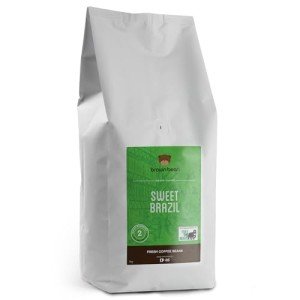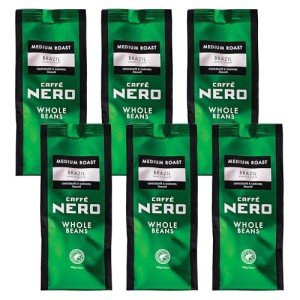Brazilian Santos light roast whole coffee beans are celebrated among coffee aficionados for their unique flavor profile and aromatic qualities. Sourced from the Santos region in Brazil, these beans boast a smooth texture and mild acidity, making them an excellent choice for those who favor a lighter cup of coffee. This guide delves into the characteristics, benefits, brewing methods, and much more about Brazilian Santos light roast whole coffee beans.
Understanding Brazilian Santos Coffee
The Origins of Santos Coffee
Brazil is the largest coffee producer in the world, and the Santos region, located on the southeastern coast, is particularly renowned for its high-quality beans. Santos coffee is typically grown at lower altitudes, which contributes to its distinct flavor profile. The beans are often processed using the natural method, allowing them to develop sweet, fruity notes that are characteristic of Brazilian coffee.
Characteristics of Santos Light Roast
Brazilian Santos light roast whole coffee beans offer a delightful combination of flavors that appeal to a range of coffee drinkers. Here are some of their notable characteristics:
- Mild Acidity: Santos coffee typically exhibits low acidity, which makes it easier on the stomach and enjoyable for those who find more acidic coffees harsh.
- Flavor Profile: The light roasting process accentuates sweet, nutty, and sometimes chocolatey notes, accompanied by a smooth finish.
- Aroma: The aroma of Santos coffee is often described as inviting, with hints of caramel and nuts, enhancing the overall coffee-drinking experience.
Benefits of Choosing Whole Coffee Beans
When it comes to coffee, freshness is paramount. Opting for whole coffee beans, particularly Brazilian Santos light roast, offers several advantages:
- Enhanced Flavor: Grinding coffee just before brewing ensures maximum flavor retention, unlocking the beans’ natural oils and aromas.
- Versatility: Whole beans can be brewed using various methods, including pour-over, French press, and espresso, allowing coffee lovers to experiment and find their preferred brewing style.
- Customization: Whole beans can be ground to different coarseness levels, catering to individual preferences and specific brewing methods.
Brewing the Perfect Cup
Brewing Brazilian Santos light roast whole coffee beans is simple, but there are some essential tips to ensure a perfect cup:
Recommended Brewing Methods
- Pour Over: This method allows for precise control over the water flow, resulting in a clean and aromatic cup.
- French Press: Ideal for those who enjoy a rich and full-bodied coffee, the French press method enhances the beans' natural oils.
- AeroPress: This compact brewing device is perfect for making a single cup with a concentrated and flavorful profile.
Brewing Tips
- Grinding: For optimal flavor, grind your beans just before brewing. A coarser grind is recommended for French press, while a medium grind works well for pour-over.
- Water Temperature: The ideal water temperature for brewing coffee is between 195°F to 205°F (90°C to 96°C). Water that’s too hot can extract bitter flavors, while water that’s too cool may lead to under-extraction.
- Coffee-to-Water Ratio: A general guideline for a balanced brew is using two tablespoons of coffee per six ounces of water, but this can be adjusted according to personal preference.
Frequently Asked Questions (FAQs)
1. What is the difference between light roast and dark roast coffee?
Light roast coffee is roasted for a shorter time, resulting in a milder flavor, higher acidity, and more pronounced acidity. In contrast, dark roast coffee has a stronger, bolder flavor with lower acidity, as the beans are roasted longer, often leading to a charcoal-like taste.
2. Is Brazilian Santos coffee suitable for espresso brewing?
While Brazilian Santos coffee is typically enjoyed as a brewed coffee, it can also be used for espresso. However, it’s essential to adjust the grind size and brewing parameters to achieve the desired flavor profile.
3. How should I store whole coffee beans to maintain freshness?
To keep your whole coffee beans fresh, store them in an airtight container in a cool, dark place. Avoiding exposure to light, air, and moisture will help preserve their flavor and aroma.
4. Can I use flavored syrups or creamers with Santos coffee?
Absolutely! Brazilian Santos light roast pairs well with flavored syrups and creamers. However, due to its delicate flavor profile, it may be best to use these additions sparingly to avoid overpowering the natural taste of the coffee.
5. Are there any health benefits associated with drinking coffee?
Yes, coffee in moderation has been linked to several health benefits, including improved cognitive function, a reduced risk of certain diseases, and increased metabolic rate. However, individuals should be cautious about their caffeine intake.
Brazilian Santos light roast whole coffee beans represent an exceptional choice for coffee enthusiasts seeking a mild yet flavorful experience. With their origins in the rich soils of Brazil, these beans are a testament to the artistry of coffee cultivation and roasting. Whether brewed using a pour-over, French press, or AeroPress, Santos coffee promises an enjoyable drinking experience that highlights its unique characteristics. By understanding its origins, benefits, and optimal brewing methods, coffee lovers can fully appreciate the distinct taste of Brazilian Santos light roast coffee.






